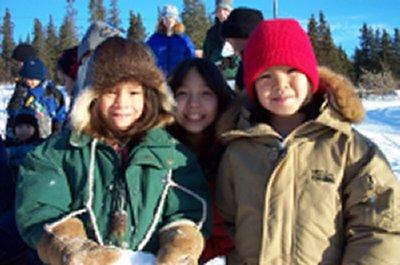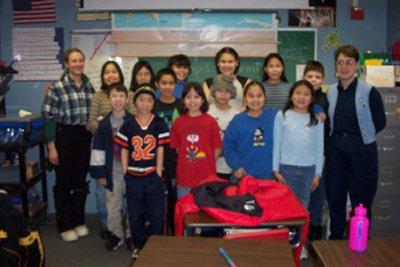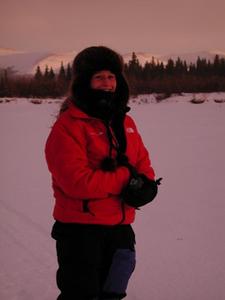4 February, 2002
--============_-1199014488==_ma============
Content-Type: text/plain; charset="iso-8859-1" ; format="flowed"
Content-Transfer-Encoding: quoted-printable
Talk about a unique drive to school!! We drove to White Mountain
School today and the drive to say the least was quite out of the
ordinary.
The air was crisp, sky was brilliant blue, and the sunshine was just
beginning to greet our Alaska day. It was a spectacular morning to
be snow machining 30 miles down the Niukluk River. The Niukluk River
is quite ominous covered with 5 feet of ice in some places. However,
on the other side the water was running in places on the river. It
was quite a scary, adrenaline rush to come to a place in the river
and see free-flowing water and realize that the snow machine has to
make it across the water. Especially watching the person in front of
you on the snow machine jump and knock off a piece of ice/snow in the
water. I just closed my eyes, pushed the gas and was thankful when I
had reached the other side of the river!! Whewww!
The ride was totally rewarding and all of my fears were worth feeling
when a large female bull moose blessed us with her presence. She was
standing alone on the frozen river as we came upon and startled her
morning. With the disruption of the snow machines, she took off
stomping through the brush. I was thankful and joyous to have my
first Alaskan moose sighting. After 2 hours of snow machining
through the remote and vast wilderness, a large building appeared on
the banks of the river. We had arrived at the native Alaskan village
of White Mountain for our visit with the school children.
White Mountain is a native Alaskan village of approximately 250
people. The village sits on the banks of the Niukluk River. White
Mountain has a school serving 64 children grades K-12. There are no
roads to White Mountain. The main form of transportation to and from
White Mountain is by airplane. We visited Cheryl Pratt=EDs classroom
of K-3rd grade and Linda Ferkinhoff class of grades 4-6th. Cheryl
and Linda are remarkable teachers and welcomed us into their
classrooms with open arms. The children are the most delightful,
loving children that I have ever encountered. Many of these children
stole our hearts!
The children at White Mountain are actually young snow scientists!
They are taking very important measurements for the SnowStar 2002
expedition. White Mountain along with other schools on our route are
taking daily snow measurements. The students have placed a board out
beside the playground so new snow can accumulate on this board. Each
day the students record the following information:
- date
- new snow amount (measured from snow board)
- total snow on ground
- Was there wind enough to move snow?
- Did it Rain?
- Was the temperature above freezing?
This enables the scientists to get an understanding of the weather
and snow patterns in this region of Alaska. On the traverse we are
going to try to follow the layers of the snow in the snow pack.
The weather was beautiful in White Mountain. After a wonderful lunch
in their lunchroom with the children, we took the students outside to
make some snow measurements with our equipment. The students took
magna probe measurements and even dug a snow pit! We also looked at
the beautiful, intricate, design in a snowflake. I can tell in the
children=EDs eyes that they one day will be Snow Scientists!
We thank you White Mountain for a wonderful visit! Thanks children
for being so special!!!! We look forward to seeing you in March!
-
--============_-1199014488==_ma============
Content-Type: text/html; charset="iso-8859-1"
Content-Transfer-Encoding: quoted-printable
<!--
blockquote, dl, ul, ol, li { margin-top: 0 ; margin-bottom: 0 }
-->cheuvront journal 02/04/02
Talk about a unique drive to school!! We drove to White
Mountain School today and the drive to say the least was quite out of
the ordinary.
The air was crisp, sky was brilliant blue, and the sunshine was just
beginning to greet our Alaska day. It was a spectacular morning
to be snow machining 30 miles down the Niukluk River. The
Niukluk River is quite ominous covered with 5 feet of ice in some
places. However, on the other side the water was running in
places on the river. It was quite a scary, adrenaline rush to
come to a place in the river and see free-flowing water and realize
that the snow machine has to make it across the water.
Especially watching the person in front of you on the snow machine
jump and knock off a piece of ice/snow in the water. I just
closed my eyes, pushed the gas and was thankful when I had reached
the other side of the river!! Whewww!
The ride was totally rewarding and all of my fears were worth feeling
when a large female bull moose blessed us with her presence.
She was standing alone on the frozen river as we came upon and
startled her morning. With the disruption of the snow machines,
she took off stomping through the brush. I was thankful and
joyous to have my first Alaskan moose sighting. After 2 hours
of snow machining through the remote and vast wilderness, a large
building appeared on the banks of the river. We had arrived at
the native Alaskan village of White Mountain for our visit with the
school children.
White Mountain is a native Alaskan village of approximately 250
people. The village sits on the banks of the Niukluk
River. White Mountain has a school serving 64 children grades
K-12. There are no roads to White Mountain. The main form of
transportation to and from White Mountain is by airplane.
We visited Cheryl Pratt=EDs classroom of K-3rd grade and Linda Ferkinhoff class of grades
4-6th. Cheryl and Linda are remarkable
teachers and welcomed us into their classrooms with open arms.
The children are the most delightful, loving children that I have
ever encountered. Many of these children stole our hearts!
The children at White Mountain are actually young snow
scientists! They are taking very important measurements for the
SnowStar 2002 expedition. White Mountain along with other
schools on our route are taking daily snow measurements. The
students have placed a board out beside the playground so new snow
can accumulate on this board. Each day the students record the
following information:
-<x-tab> </x-tab>date
-<x-tab> </x-tab>new
snow amount (measured from snow board)
-<x-tab>
</x-tab>total snow on ground
-<x-tab> </x-tab>Was
there wind enough to move snow?
-<x-tab>
</x-tab>Did it Rain?
-<x-tab> </x-tab>Was
the temperature above freezing?
This enables the scientists to get an understanding of the weather
and snow patterns in this region of Alaska. On the traverse we are
going to try to follow the layers of the snow in the snow
pack.
The weather was beautiful in White Mountain. After a wonderful
lunch in their lunchroom with the children, we took the students
outside to make some snow measurements with our equipment. The
students took magna probe measurements and even dug a snow pit!
We also looked at the beautiful, intricate, design in a
snowflake. I can tell in the children=EDs eyes that they one
day will be Snow Scientists!
We thank you White Mountain for a wonderful visit! Thanks
children for being so special!!!! We look forward to seeing you
in March!
-<x-tab>
</x-tab>
--============_-1199014488==_ma============--

Beautiful children at White Mountain!

Linda's class at White Mountain!

On the trail to White Mountain!
Contact the TEA in the field at
.
If you cannot connect through your browser, copy the
TEA's e-mail address in the "To:" line of
your favorite e-mail package.
|
